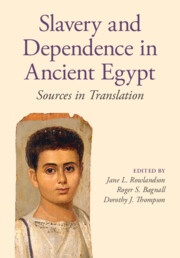Book contents
- Frontmatter
- Contents
- List of illustrations
- List of maps
- List of contributors
- Biographical notice on Jane Rowlandson
- Preface
- List of abbreviations
- Note to the reader
- Aids for the reader
- Glossary of technical terms
- 1 Introduction
- 2 Pharaonic Egypt
- 3 The Late Period
- 4 Jewish perspectives on slavery in Egypt
- 5 Ptolemaic Egypt
- 6 Roman Egypt
- 7 Byzantine and Umayyad Egypt
- Concordance of texts
- Bibliography
- Index
7 - Byzantine and Umayyad Egypt
Published online by Cambridge University Press: 01 March 2024
- Frontmatter
- Contents
- List of illustrations
- List of maps
- List of contributors
- Biographical notice on Jane Rowlandson
- Preface
- List of abbreviations
- Note to the reader
- Aids for the reader
- Glossary of technical terms
- 1 Introduction
- 2 Pharaonic Egypt
- 3 The Late Period
- 4 Jewish perspectives on slavery in Egypt
- 5 Ptolemaic Egypt
- 6 Roman Egypt
- 7 Byzantine and Umayyad Egypt
- Concordance of texts
- Bibliography
- Index
Summary
Covering late antique Egypt into the period of Arab rule, this chapter introduces documents and literary texts translated from Greek, Coptic, and Arabic. In the countryside, coloni joined slaves and dependents at work on the great estates of Byzantine Egypt, while in the cities slavery continued as before. Coptic literature from the same period introduces servitude within Christian monasteries. The writings of Shenoute and Gnostic texts regularly employ the vocabulary of slavery in a negative sense. The trade, employment, and emancipation of slaves continued. Conscripted labour is also documented. Children and adults donated to monasteries represent a new form of sacred servitude. With the Arab conquest of Egypt, war and raiding resurface as important sources of slaves. Nubia and the Near East were again key areas for their acquisition, and slaves are illustrated as active in most areas of life and integrated into the religious life of their owners’ households.
- Type
- Chapter
- Information
- Slavery and Dependence in Ancient EgyptSources in Translation, pp. 343 - 431Publisher: Cambridge University PressPrint publication year: 2024



